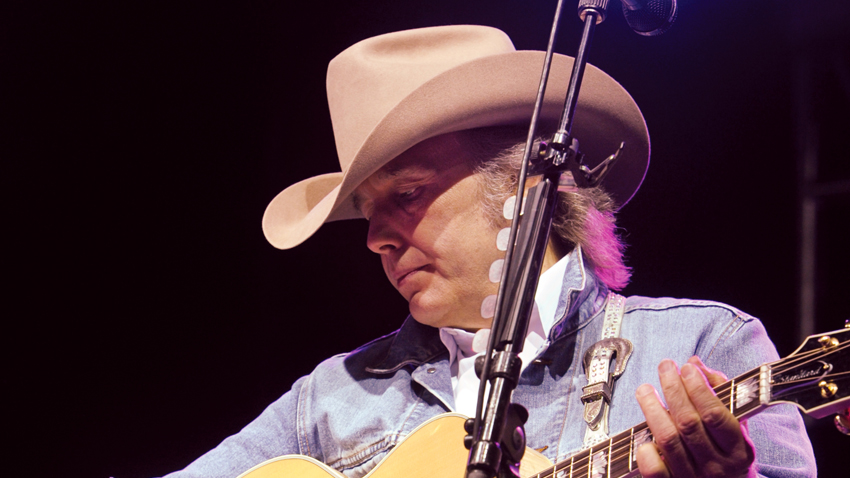
The problem with guys who are too country for rock 'n' roll and too rock 'n' roll for country is that they wind up being too much or too little of one or the other, and then nobody can figure them out. Nobody can really figure out Dwight Yoakam, either - his sound and sensibilities are as much informed by the British Invasion and LA garage punk as they are by Bakersfield and Appalachia - but that hasn't stopped him from becoming a one-man genre and musical hyphenate unto himself, and a successful one at that.
Yoakam seems to thrive on pitching curve balls, and his adventurous and deeply introspective new album, 3 Pears, might be his most rewarding effort yet. Coming off something of a self-imposed sabbatical - it's the singer's first set of originals since 2005's Blame The Vain - it's the sound of an artist rediscovering and reaffirming his commitment to music.
"It's about... joy," Yoakam says, ruminating on his artistic agenda of late. "That sounds incredibly flippant, but it's actually the most profound thing I could acknowledge as the motivation for making music. Joyful noise is what it's all about. It's what it's always been about. I hope that what I've accomplished."
Since 2002, Yoakam has worked without his longtime producer/guitarist and bandleader Pete Anderson, and 3 Pears sees the singer flying solo or collaborating spiritedly with Kid Rock (Take Hold Of My Hand) and another musical quick-change artist, Beck (A Heart Like Mine, Missing Heart). Yoakam has always been a complex customer, equal parts rogue and hopeless romantic, and his uncanny ability to jump from heartstring-tugging balladeer to butt-kicking rave-up king makes 3 Pears a continually surprising experience.
Yoakam sat down with MusicRadar recently for a wide-ranging conversation that focused on his creative process, how he rediscovers the music of his youth on Spotify, what it was like to work with Beck and Kid Rock, and why he just loves his signature Epiphone and Gibson models.
Tell me more about the "joy" you mentioned, the need to make "joyful noise" - which I don't think sounds flippant at all.
"I wanted to get back to that special thing that I found in music when I was 15, 16 years old; that feeling I had when I started to perform early on, as well as when I was in my 20s and put a band together in LA. I wrote a song on the Blame The Vain album called I Want To Love Again. It was couched in the lyrical context of a love relationship, but I was consciously aware while I was writing it that it was about my relationship with music. It was addressing 'I want to love again, feel young again, the way I did when it was true.'
Get the MusicRadar Newsletter
Want all the hottest music and gear news, reviews, deals, features and more, direct to your inbox? Sign up here.
"Success causes the expression through music to be saddled with the undue weight and concern to continually do it in a commercial sense. It was great to have the touchdown moment and have music be something that would support me independent of a day job. That was a major accomplishment in my 20s, when I was able to live and pay rent as a musician - to survive as a musician.
"Ironically, what happens when you achieve success and have greater and greater successes is that you encumber the dependency on artistic expression to maintain your life as it grows, and at that point the music can be asked to compromise. It's hard to have it both ways sometimes. I've been fortunate in that I've had a career where I was able to maintain the integrity of joy in while still realizing commercial success.
"I love hearing certain songs and seeing album covers and just drifting back… I can be sitting in the studio with the band, and I'll stream something on Spotify and just go back in time. I love when the original album artwork comes up - and that's so cool."
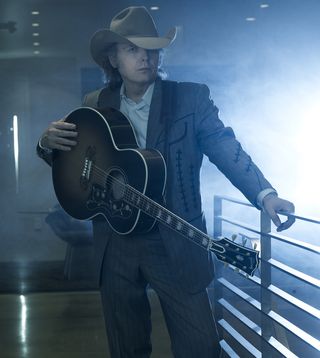
On making musical compromises, Yoakam says, "Nobody has ever forced me to do that. I wouldn't know how, anyway."
"I remember pulling up David Essex's album Rock On - he just came to mind one day. That record came out in '73, when I was in high school, and just seeing that cover took me back to a band rehearsal room in the instrumental music department across from the backstage area of the theater. I was there again. Hearing that song and seeing the art did all that."
You don't seem like a guy who "plays the game." You don't fit neatly into any one genre. In many ways, you remind me of Johnny Cash.
"Well, my observations are not going to be objective [laughs] - they're going to be subjective. I've been able to sustain a substantial livelihood without ever being asked to compromise. Nobody has ever forced me to do that. I wouldn't know how, anyway. Thinking about other artists who never went along - be it Neil Young or your example, Johnny Cash - they really sustained a pertinence to their own inner voices.
"I've only been with two major labels, and they've both been the same: Warner Brothers. I couldn't have landed at a better spot in the beginning than Warners in the '80s, which was still the Warner company that it was in the '60s and through the '70s. It was Mo Ostin and Lenny Waronker running it, and their philosophy permeated the company. Lenny executive produced this album with me, so he's back there as a kind of godfather-shepherd at the label."
When you mentioned David Essex, it made me think of all the rock songs you've covered -
"But I've never covered Rock On. [Sings] 'Still lookin' for that blue jean baby queen… ' [Laughs]
I'm curious - when you were just starting out, did you consider a career as a straight-up rock artist?
"Yeah, sure. Except that from high school on, I knew country-rock - the hyphenate had happened - and that was my savior, because there were certain styles of rock music that just lent themselves to me and my voice. I would sing Don MacLean's American Pie in high school or different James Taylor songs, but I would just as likely do Buddy Holly material, or it might be the Everly Brothers. The kids in Columbus would look at me like I was from Mars when I did a Stonewall Jackson song. It'd be like, 'Where are you from?' [Laughs] 'Oh, a little place on the backside of Mars called Pikeville, Kentucky.'
"Pikeville is only 90s miles from Columbus, but culturally it's Appalachia. In truth, there was a lot of country music in Ohio, too. I listened to all of it, and I loved rock music, but I knew that my expression was in some hybrid expression I was bound to make."
How did you come to work with Beck? Are you a longtime fan?
"There are these spike-out moments in his career that stood out - Loser was one, and then the Odelay album with the song Devil's Haircut. So I was aware of Beck as an artist, meaning his presence on shows that I would catch, or sometimes I passed through an awards show and saw him perform. Loser fascinated me. It reminded me of Radiohead's Creep - now, that one I went out and bought, back in '93.
"I love Creep. The gate opens up on whatever the hell amp he's got and, and you hear the pop. It sounds like the engineer took off the mute, and you hear it lift. It's like, 'Look out!' [Laughs] The guitarist sort of rakes the pick across the strings, like he's checking to make sure it's turned on. It's incredible. That's genius that they left it on as part of the record.
"OK, so Loser is in that same category of reckless, pre-grunge breakout. So I knew that song and the EP, and I knew Beck's album Sea Change, which was very melodic. I got curious about him. He and I had bumped into each other at a Sheryl Crow birthday show at the El Rey Theatre. We both played that night; we chatted but never engaged each other musically. So I just reached out, and I got a call back to say, 'He's interested.'
"We sat down in my office and had a four-hour meeting. I sang a few things, but I think only one of them made it to the album. A whole shift happened in my label situation, and it put things in limbo for a while. After a while, though, as it turned out, Beck called me back, and I started talking to him about a Creedence-y thing that I was thinking about.
"I went over to his place, and he had already had his engineer play a drum pattern. It thought it was cool, so I started playing the groove I heard on guitar. Meanwhile, Beck is running around, plugging things in, turning switches, putting me into Pro Tools - and it became A Heart Like Mine. The slap-back echo you hear is an Otari. It's got sound-on-sound, so it's tape slap."
There's an unmistakable early Stones vibe to the song - the trashiness of the guitar sound.
"It's funny about that. I put down what I thought were just scratch electrics. I told Beck, 'We'll get somebody else to do these later.' But he said, 'No, no. You've got to listen to this. And you've got to put another electric on right now.' And he was right, too. I deferred to his objectivity. There was a recklessness about it, a quality of the sonic. Beck said to me, 'There's something very important about what you're saying in the raw emotion of this music.' I thought about it and said, 'Agreed. So let's let it be.'
"I was talking to Lenny, and I said, 'If we were trying to, we couldn't have sounded any more like the Stones' The Last Time. In terms of spirit, I mean - without the rhythm, without the melody, but the same song - the quality of the sonic is there. It's like the Stones colliding with Johnny Cash. Lenny looked at me and said, 'Yeah, but it's totally of this moment.'"
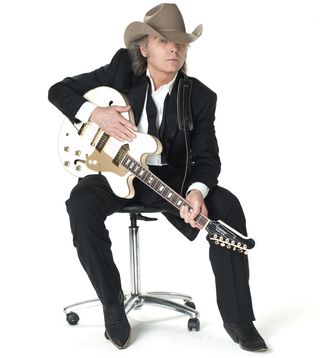
Yoakam with his "Dwight Trash" Epiphone Casino. "The Casino gave us everything Beatles," he says, "from just a little before Revolver onward."
What was it like working with Kid Rock? Take Hold Of My Hand is a pretty heartfelt song.
"Well, you know what? That one only took 20 years and three hours to write. I had partially written it in 1990 or '91. I fooled with it and fooled with it, and I had that initial hook and that melody - [sings] 'Take hold of my hand, and I'll do what I can'… I went over to Kid's place, he's got a place here in town, and I played that little bit for him, and he got all excited.
"He fired up a cigar and started pacing back and forth - he's a pacer [laughs]. Then he sat down at the keyboard while I played guitar. We tossed things back and forth, back and forth. He drove it home, you know. I owe him a debt of gratitude for that - in addition to the publishing [laughs]."
Your cover of The Bee Gee's To Love Somebody is featured on the extended version of the album. What drew you to that song?
"We had been doing the song live, kind of as a lark, and so we just decided to cut it as a bonus track. We did it before Robin Gibb passed. I just love the song. We embellished a little bit. Hopefully, Barry is OK with the poetic license we took. [Sings] 'Love somebody… love somebody…' I thought, How do you improve on something so great? It's one of the best hook-lyrics in pop-rock history.
"I'm a sucker for all the pre- and up to Lonely Days stuff. And even Jive Talkin' - when that came out, I was in college, working at an all-night gas station. I heard that come on over the radio, and I was like, 'What in the world… ?' It was amazing! The production on that is badass. But go back to the early stuff, and it's all gloriously great. The Brothers Gibb."
You got to know Buck Owens quite well, and of course, you worked with him. What did you take from him as a guitarist?
"Buck was pretty exceptional. He went out on tour with me in '88, after we'd cut Streets Of Bakersfield. I remember when he walked out on stage and plugged into this Fender Twin Reverb that was right behind me and in front of the drum kit. Let me tell you, it was one of the loudest moments on stage I had ever heard. [Laughs] Buck liked it loud. He was all about the exuberance of the honky tonk.
"Merle Haggard told me a while ago, 'For my money, Buck Owens was one of the greatest, if not the greatest, country lead guitar players even before he had a career as an artist. And people are unaware of it. He was playing lead guitar on all that Tommy Collins stuff and a lot of the Wynn Stewart songs.' That's how Buck got signed to Capitol records. He was a session lead guitar player."
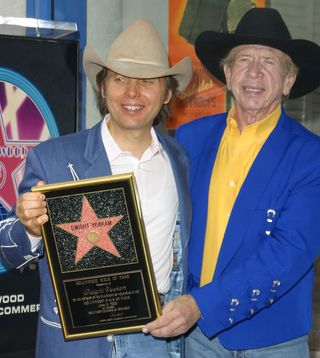
"Buck was pretty exceptional," Yoakam says of his late friend and mentor, Buck Owns. © Corbis
"One time, Buck told me the story of how Tommy Collins came to see him late at night years ago. Tommy had driven 40 miles to go all the way to Buck's house. Buck opened the door, and Tommy marched in and said, 'Buck, son, now I know you've been down there at Capitol playing on other people's records.' Buck started to say something, but Tommy said, 'No, no, no. But I just want to say… Don't play any of the licks you're doing on my records on theirs.' [Laughs]
"He had driven all that way just to tell Buck not to use his guitar licks. How about that? I told him, 'You should've said, 'OK, Tommy, but if I have to do 'em… I'll play them poorly!'" [Laughs]
Let's talk about your guitars. Now, you have some signature model Gibsons and Epiphones…
"Yeah, I stumbled onto the Casino a few years ago. I like the archtop effect it has in that it's something of a hybrid of a solidbody electric and an acoustic. Those gritty, grungy, buzzy single-coil P90 pickups - and you know they pick up every weird light in the building. I have to turn away from the amp and turn it to the middle selector - and I use bridge position, too, just out of the sheer sonic violence of it.
"The Casino gave us everything Beatles, from just a little before Revolver onward. Those are the guitars on Revolver; it's Revolution, the electric version, the one that's the B-side to Hey Jude. Listen to what John Lennon is doing. [Imitates the guitar opening pattern.] There's nothing else that sounds like it.
"Gibson tried to do that before they bought Epiphone. They tried to compete with the 330, because the 335 has solid wood down the middle. So I just found the Casino and fell for it. I'm really an acoustic player. I have little or no business putting my hands around an electric. I'm just doing it for the sheer excitement of it."
Tell me about the Gibson Honky Tonk Duece acoustic.
"Yeah, well, I did that, but some years earlier I did the Y2K, which is the J-200 Junior, the original Everly Brothers model. I had begun using the full-sized J-200, starting with Blame The Vain. I just fell in love with it. I use Martins a lot on records, although on this album it's all Gibsons. I played the J-200 and the J-160 - you know, the Southern Jumbo, which is the Honky Tonk Duece."
"Other than a Martin D-28, that's the only guitar you'll ever see Hank Williams Sr. having played throughout his career. Gibson was willing to do it for me in solid rosewood, sides and back. So I did it as the Honky Tonk Duece in 2002. I haven't done another acoustic, although I might at some point do a variation of the J-200.
"They wanted to do a variation of the Casino, and I had this idea to of taking the Firebird headstock, the reverso, the upside-down scroll, and that's what we ended up doing as the 'Dwight Trash' Casino. It came out last year, and it's been a ball to play.
"But independent of that, without consulting a luthier, it shifted the tone - and I thought, Of course it did! It gave it a deeper, throatier sound. I still play the traditional Casino Elitist, which is the one that John and George were using in '65 and '66. But I also used mine a lot on the record, the one with the reverso headstock. The high E is a little shorter and tighter, but the low E - look at where that ends up."
What are your thoughts on the guitar sounds you hear on current country recordings?
"Well, look, whether it's country, pop, rock, it's all become much more digital, not only in its delivery but its creation. For me, I'm not interested in creating that sound as such. I certainly use digital technology as far as delivering the music. In other words, we're not recording on tape, although on Blame The Vain I did - I cut the whole album to two-inch, 24-track tape.
"After that, on the Buck album [2007's Dwight Sings Buck], I went straight 96K all-digital. But that's just a delivery mechanism. Everything in front of the board and on the backside of the board is being created with real gear, real guitars and mic pres that are tube. I'm using Fender Super Reverbs, Deluxes - Eddie Perez did some guitar stuff on this album on a Deluxe. Most of the electric guitars on the album are running through a Vox AC30 or a Super Reverb."
There is a very punchy, clear, resonant and natural tone to the guitars on 3 Pears - they don't have that processed sound that is common nowadays.
"Thank you. Hopefully, that resonates with the public. I still think that the organic element of music is key to making it human, that it has a human quality and its fit for human consumption." [Laughs]
We have to talk a little about your acting. I've always felt that you were overlooked for your role in Sling Blade - you should've been nominated for an Oscar.
"Thank you for saying so. The movie was a great experience. It got nominated for two Oscars and won one. I was ecstatic that Billy won for the screenplay. I mean, we were a little movie that nobody even knew about when we were filming it in Bentonville, Arkansas. Cut to two years later and Billy's at the Academy Awards with it. He wrote that so well. You didn't have to do anything with what was on the page."
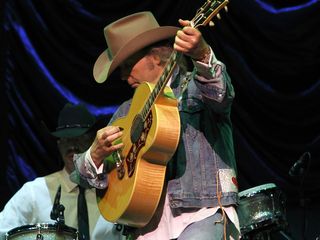
On stage at the Moody Theater. Austin, Texas, 2012. "I still think that the organic element of music is key to making it human," says Yoakam. © Scott Moore ./Retna Ltd./Corbis
We have musicians who act and actors who play music. Who do you think does it well?
[Long pause] "You know… there was a moment when nobody did it better than Cher. Think back to Moonstruck and that kind of performance. And one of the best singer-songwriters who has done quite well with acting is Kris Kristofferson. We were in two movies together - Bloodworth and The Last Rites Of Ransom Pride. Oh, and Tom Waits has had quite a run, too."
You delved into directing with South Of Heaven, West Of Hell. Are there any filmmakers you've followed closely, anybody you can point to as an influence?
"Studied? I don't know… I'm not radically literate in film, but I am a fan. Jim Glennon was my DP on South Of Heaven, West Of Hell - he would establish the look and become principle DP on Deadwood. I would go on the set and turn out lights. 'Shafts and shadows, Jim,' I would say, and he would just laugh. We did that movie as an homage to his father, Bert Glennon. Bert did The Scarlet Empress and Blonde Venus - Marlene Dietrich films that Josef von Sternberg directed. I watched those movies, along with Bergman's The Seventh Seal; I would watch as I created. I'm also a fan of Peckinpah. Speaking of Kris Kristofferson, there's Pat Garrett And Billy The Kid. With South Of Heaven, I was paying tribute to that movie in a lot of ways.
"You know, every movie that gets made is a minor miracle, especially independent films. South Of Heaven might have cured me of directing. [Laughs] No, actually, I loved it. I loved the act of directing, and I'd do it again if the opportunity presented itself and it was under the right circumstances."
Joe is a freelance journalist who has, over the past few decades, interviewed hundreds of guitarists for Guitar World, Guitar Player, MusicRadar and Classic Rock. He is also a former editor of Guitar World, contributing writer for Guitar Aficionado and VP of A&R for Island Records. He’s an enthusiastic guitarist, but he’s nowhere near the likes of the people he interviews. Surprisingly, his skills are more suited to the drums. If you need a drummer for your Beatles tribute band, look him up.
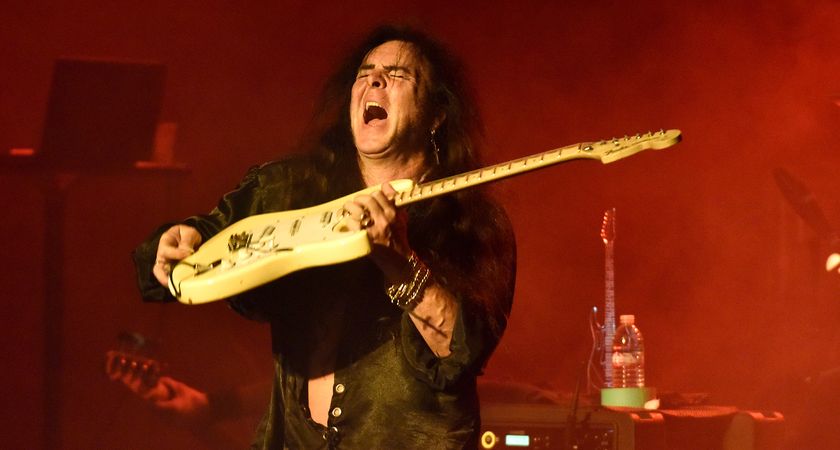
“Those arpeggios... That was the sickest thing I ever heard”: Yngwie Malmsteen on why guitarists should take inspiration from players of other instruments if they want to develop their own style
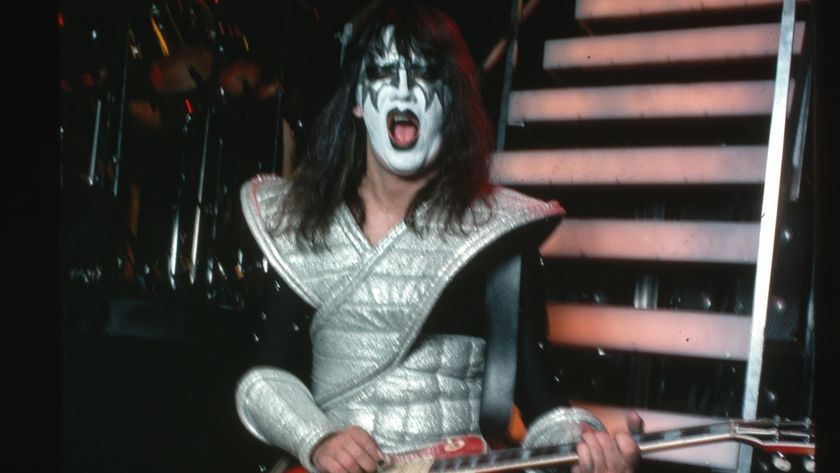
“I used a flange on the main riff and a wah-wah on the solo. I just said, ‘Hit the record button and I’ll let it rip!’”: Kiss legend Ace Frehley on his greatest cult classic song










